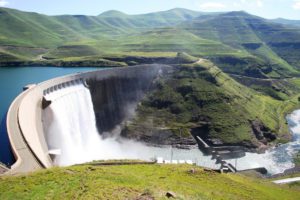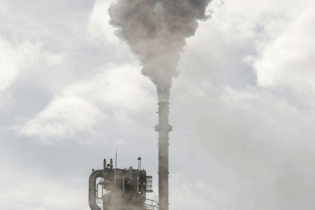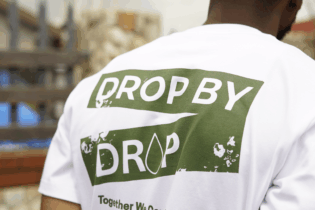The Lesotho Highlands Development Authority (LHDA) marked an important milestone today with the launch of the Polihali Dam construction tender to the market.
This marks the start of procurement for the second main works construction tender and follows on the May tender for the construction of the Polihali Transfer Tunnel. The Polihali Dam will be a concrete-faced rockfill dam (CFRD) similar to the Mohale Dam, which was built during Phase I of the Lesotho Highlands Water Project (LHWP). The embankment will stand approximately 166m high, have a crest length of about 920m and a crest width of 9m. Over 14 million cubic meters of rock which will be quarried locally within the dam basin will be compacted to form the embankment. The dam will create a reservoir on the Senqu and Khubelu rivers with an estimated surface area of 5 053 hectares and a full supply storage capacity of 2 325 million cubic meters. The Polihali Dam infrastructure also includes a 43m high, 600m crest-length CFRD saddle dam, a spillway and a compensation outlet. The flow from Polihali will increase the volume of water to be transferred from the Katse Dam, the center point of the Lesotho Highlands Water Project which was constructed during Phase I. The current water transfer volumes to the Gauteng region of South Africa will incrementally increase from 780 to 1 270 million cubic metres per year. This will also simultaneously increase the energy generated by the ‘Muela hydropower plant from approximately 500GWh to 800GWh per year, a further step in the process of securing an independent power supply to meet Lesotho’s domestic needs. “The launching of the construction of the main works open tender is the culmination of years of planning and hard work of dedicated design and procurement teams. Our objective with this final procurement stage is to attract suitably qualified companies with the capability, experience and resources to undertake the construction of the Polihali Dam within the set timeframes and to the required quality,” stated Tente Tente, CE of the LHDA.The Phase II Agreement encourages the Project to benefit the economies of Lesotho and South Africa but emphasises the need for procurement that fosters competitiveness, transparency, cost-effectiveness and quality. LHDA’s robust Procurement Policy and tender evaluation protocols will ensure a fair and transparent procurement process.
The launching of the dam construction tender process marks the start of the final construction phase of the water transfer component under Phase II of the Lesotho Highlands Water Project. Interested construction firms have up to 12 November 2021, to submit tenders. Specific information on the requirements and conditions of the tender is available on the LHDA website at http://www.lhda.org.ls/tenderbulletin/currentProcurement.aspx. The Matla a Metsi Joint Venture which comprises Lesotho, South African and international experts: GIBB (Pty) Ltd; MPAMOT Africa (Pty) Ltd; Tractebel Engineering SA; LYMA Consulting Engineers of Lesotho, was awarded the Polihali Dam design and construction supervision contract in 2017. The Polihali dam construction procurement is launched as construction activity on ten advance infrastructure contracts progresses steadily with some contracts expected to be completed in 2021. Construction of the 33kV line, which will provide a temporary power supply to the Polihali village, was completed in 2020. Work on the 132kV line has advanced with the construction of access roads, 91 tower foundations and the erection of 84 towers out of a total of 93. The Polihali and Katse civil works; access roads, pipe laying for potable water and sewerage lines have been completed, and construction on the main access roads is underway. Excavation on the Polihali diversion tunnels is close to completion with breakthrough on both tunnels expected in the second half of August. According to the current master programme, water delivery is scheduled for 2027/28. Timeous construction of the dam and transfer tunnel is critical to meeting the water delivery deadline of the project. Phase II of the Lesotho Highlands Water Project builds on the successful completion of Phase I in 2003. It delivers water to the Gauteng region of South Africa and utilises the water delivery system to generate hydroelectricity in Lesotho.





